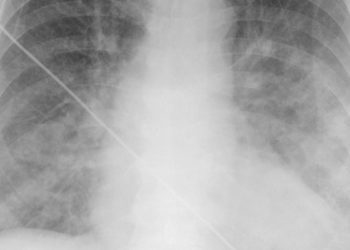The RELAX-AHF-2 trial: serelaxin provides no mortality benefit in acute heart failure patients
1. Patients hospitalized with acute heart failure (AHF) randomized to receive the vasodilator serelaxin experienced similar occurrence of death from heart failure at 180 days compared to placebo treated patients.
2. A more immediate outcome, worsening of AHF at 5 days, also showed no benefit for serelaxin compared to placebo treatment.
Evidence Rating Level: 1 (Excellent)
Study Rundown: Acute heart failure is a leading cause of hospitalization and notable morbidity and mortality occurs for patients following an AHF event. Relaxin is a physiologic hormone which contributes to vasodilation during pregnancy and has been considered a possible treatment for cardiovascular conditions. Serelaxin is a recombinant form of relaxin-2 and previously has been shown to lower incidence of AHF worsening during hospitalization, though mortality benefits were not fully evaluation. The second Relaxin in Acute Heart Failure (RELAX-AHF-2) trial compares patients randomized to serelaxin and placebo. The primary endpoints of cardiovascular mortality at 180 days and worsening of AHF at 5 days post-initial treatment showed not significant difference between serelaxin and placebo in either outcome. Blood pressure was notably lower in the treatment group. Both serious and overall adverse events occurred at similar rates between the two groups.
This large randomized study provides clarifying evidence for exploratory mortality outcomes in the RELAX-AHF trial, suggesting no mortality benefit for AHF patients treated with serelaxin. The trial was strengthened by its randomized design and large trial size but limited by the length of follow-up, as longer follow-up may have suggested some separation in treatment efficacy.
Click to read the study in NEJM
Relevant Reading: Serelaxin, recombinant human relaxin-2, for treatment of acute heart failure (RELAX-AHF): a randomised, placebo-controlled trial
In-Depth [randomized controlled trial]: This double-blind, multicenter, randomized, placebo-controlled trial enrolled patients between 2013 and 2017. Eligible patients were adults hospitalized with AHF and dyspnea, had congestion on chest x-ray, had elevated brain natriuretic peptide levels, and were expected to receive intravenous therapy for at least 48 hours. Patients were randomized in a 1:1 ratio to 30 μg/kg/day of serelaxin for 48 hours (n=3274) or placebo (n=3271). If a patient’s systolic or absolute blood pressure was significantly deceased with treatment the dose was adjusted. Patients were assessed for the first 5 days of treatment or until discharge and then followed-up with out to 180 days. The primary outcomes were death from cardiovascular outcomes by 180 days and worsening of acute heart failure at 5 days. Treatment was discontinued in 21.9% and 15.7% of serelaxin and placebo patients, respectfully, due to hypotension. At 180 days death from cardiovascular causes occurred in 8.7% of serelaxin and 8.9% of placebo patients (hazard ratio, 0.98; 95% confidence interval [CI], 0.83 to 1.15; P=0.77). Worsening of AHF at 5 days occurred in 6.9% and 7.7% of serelaxin and placebo patients, respectfully (hazard ratio, 0.89; 95% CI, 0.75 to 1.07; P=0.19). Both per-protocol and intention-to-treat analysis showed similar efficacy results. The median length of hospitalization was similar in the two groups. Approximately half of patients in both groups experienced an adverse event in the first 5 days of treatment. Serious adverse events also occurred at similar rates between treatment and placebo groups.
Image: PD
©2019 2 Minute Medicine, Inc. All rights reserved. No works may be reproduced without expressed written consent from 2 Minute Medicine, Inc. Inquire about licensing here. No article should be construed as medical advice and is not intended as such by the authors or by 2 Minute Medicine, Inc







